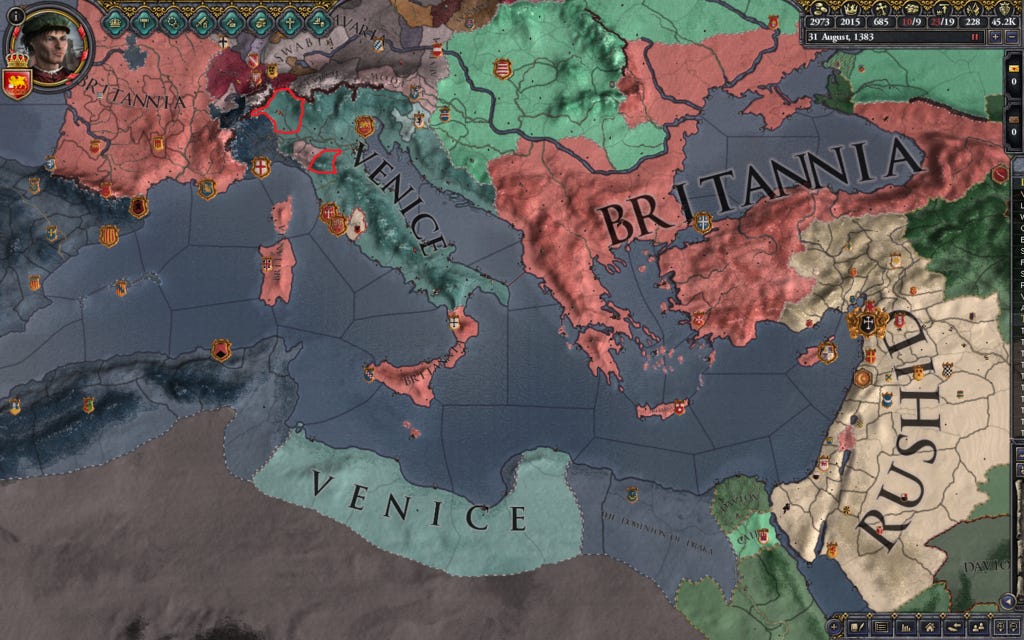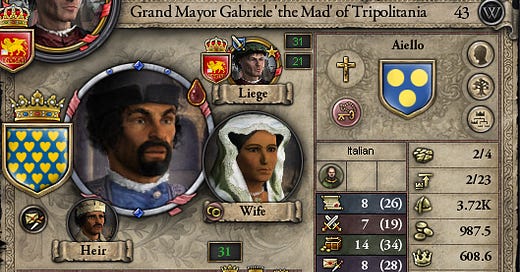Azure Three Bezants: Dreaming of the Desert
Last night I dreamed again of Egypt. The same dream, of a silent desert lit by stars. There was no moon, yet I could see everything, dune upon dune, with my footprints leading back to the horizon in a perfectly straight line. A line pointing to the temple, not yet visible, where the Hound sleeps its thousand-year sleep and howls in its dreams... in its dreams, and mine. I dreamed and knew myself dreaming, yet in spite of a sourceless horror I could not wake myself nor stop myself walking towards the - temple, did I say? Yes, it was built as ancient Egypt built houses for its gods, and their prayers were written on every surface; though I could not yet see the cyclopean walls, I knew this, in my dream, in the same way I knew that the eerie light I saw by did not come from the unblinking stars. But for all that it was no temple. The Egyptians had built as well as they knew, and covered stone and mortar with incantations, not to honour the Presence within the walls, but to contain it. Not temple nor church nor fane, but prison. I woke, as I have woken before, slick with cold sweat, with my pulse pounding in my forehead near to making it burst. But my usual desperate relief - this night, again, I had not seen the Hound's prison - was threaded through with despair. A week without the dream, and I had thought myself free of it. A week of vicious hangovers; a week of Elisabetta's increasingly unsubtle hints. Tiny, tiny prices, for nights of dreamless sleep. But now even the wine has failed me. Tonight, I will walk the desert again, silent except for the soft hiss of the sand. I will walk, unwilling, towards the place where the Hound lies imprisoned. And some night - not tonight; God of my fathers, let it not be tonight - but some night I will crest the final dune, and the silver light that does not come from the stars will show me the walls of the Hound's resting place. And I will walk forward, and enter it, and... and I know not what; but I would much rather die, than find out. It's said - though I do not know how it is known - that the pain is only momentary, if you lie in a hot bath and cut lengthwise, not crosswise. That is sin, and will doom me to Hell; and yet it is still true, that I would rather be tormented by all Satan's legions for all eternity, than enter the place where the Hound lies sleeping. For I might find that it sleeps but lightly. Yet I am an Aiello, and one of God's chosen people; I will make one more throw of the dice, before I give up the game, and my soul, for lost. I will go to Egypt, and not alone; I will bring men, learned men and hard men both. They will think me mad, but what of that? The ducats of madmen spend as well as any. I will find the desert, where the high singing silence hisses in the eternal moonless night... and I will see it in daylight, under the hot scorching sun of Egypt that drives away dreams. I will walk into the desert, not alone and screaming in unvoiced horror, but with a hundred loyal men at my back. And when I find the Hound's prison - after all, the men of Egypt drove it into the walls, and bound it there with chants and sacrifice. And they had no gunpowder. From the journal of Gabriele Aiello, one of the last entries before his death. The calling of the sensitives was the first near-open blow struck by the Hound in the Long War, and one of the shrewdest. For two centuries it bled us of the talent we needed to fight it; by the time we realised we were at war, only the thinnest scraps remained, and on the spiritual front we were outmatched from the beginning. Gabriele should not have put his faith in gunpowder, however impressive the new invention seemed to him. A man sensitive enough to hear the Hound's call across three hundred miles of ocean could have driven it back to sleep in a day, if only he'd known the chants and sacrifices the Egyptians used. What we could not have done with such a Talent as that, when it finally came to open war! But Gabriele was a man of the fourteenth century, and trusted in rational things and in technology. He was neither the first nor the last to make that mistake.

Gabriele Aiello, some time after the Hound began working on him, but before the bolts of his mind came fully loose.

The minor powers are being shaken out of eastern Europe; last week it was Hungary, and now it is Poland. King Cruel had been happy with his title of Quietest Player Ever up to the point where he briefly inherited Hungary; the inheritance was against the rules and was rolled back, but it gave him a taste of power, and he wanted... more. More of everything. And so he reached for the Forbidden Arts, the one thing our good and generous liege had forbidden to his vassals: He took the Intrigue Focus. Was he, perhaps, under the influence of the Hound, at the time? It is hard to say; one would think that even that powerful Entity would have difficulty reaching so far, across the Med and hundreds of miles of hostile land, so early in the game. Of course, it is known to desire the crumbling and internal strife of the civilisations it regards as its enemies; but then, it should rather strengthen Poland, the better to use it as a dog's-paw in a future conflict. No, most likely we deal here with simple human greed and ambition; if the truth were told, the Hound's work is not that difficult, for humans do not really need the hostile influence of Other entities to store up trouble for themselves. The Intrigue Focus in the hands of a human vassal is vastly dangerous for a liege; it is not forbidden in Germany by an arbitrary whim of the Kaisers. Jacob immediately revoked the Kingdom of Poland, provoking a civil war, which of course Poland could not possibly win. There is no longer a kingdom on the Vistula, nor a player slot.

Eastern and central Med, 1383. Don't be fooled by the western colonisation of bits of Egypt, that just allows the Hound to do its work on the administrators and garrison officers sent there to rule the province; they will return home as plague vectors, empty-shelled parodies of humans that will undermine and demoralise their metropolitan societies. By the time open warfare breaks out, the Western world will be half-lost in dreams of decadence, unable to muster its strength even for a deadly threat.


